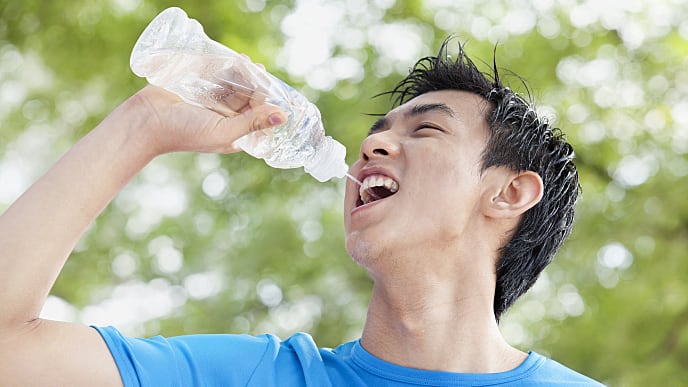Did you know that your tongue can reflect your overall health? Often, when there's something off-balance with your body, your health care provider can tell just by looking at your tongue. This is especially true when it comes to dehydration. While dehydration isn't localised to just one area of the body, a dehydrated tongue can signal that you need better hydration.
Signs of Dehydration
The Natural Hydration Council recommends that the average man and woman drink 2.5 and 2 litres of water each day, respectively. Unfortunately, it can be easy to neglect your body's hydration needs. That's when you become dehydrated – a state where your body doesn't have the amount of fluid required to function. Most day-to-day cases of dehydration are moderate and can be cured by increasing water or fluid intake. When dehydration becomes more serious, however, you'll notice it in your body's functions. Urination becomes dark and less frequent and you might get a headache. As dehydration becomes more serious, the NHS warns that you could experience unusual tiredness, confusion, dizziness that doesn't pass, a weak pulse, and even fits.
When you're not properly hydrated, your body works to conserve the fluid it does have. That's why one of the first signs of dehydration is decreased saliva production. Your tongue might feel dry and even swollen as your body reduces saliva production to conserve fluid. A dry, dehydrated tongue isn't a sign that your mouth is dehydrated; it's a sign that your entire body requires more fluids.
Signs of a Healthy Tongue
According to the NHS Warwickshire, a normal tongue is covered with thousands of tiny projections called papillae which give the tongue a rough textured surface and can occasionally be red and large, smooth and round. It should also be well-moistened, with saliva functioning to help you break down food before digestion and coat and protect your teeth from bacteria and decay. If your tongue is dry and rough, it could mean that it's not well-hydrated. Drinking more water should be your first line of defence against dehydration, but you can also try chewing sugar-free gum or sucking on ice or lozenges to help relieve the dry mouth that can accompany dehydration.
Potential Health Issues
If you feel like you're well-hydrated and drinking enough water every day, yet you're still suffering from a dry, dehydrated tongue, it might be a sign of a more serious issue. If the problem is chronic, it's best to talk to your health care provider. Some of the causes of a dry tongue and mouth include:
- Autoimmune diseases such as Addison's disease and Sjogren's syndrome
- A side effect of medication
- A side effect of chemotherapy or radiotherapy
- Hormonal changes
- Infection
While you're experiencing a dehydrated tongue, it's important to keep your teeth safe from the effects of low saliva. Brush and floss regularly, and use peroxide-free and alcohol-free mouthwashes to avoid drying out your mouth.







